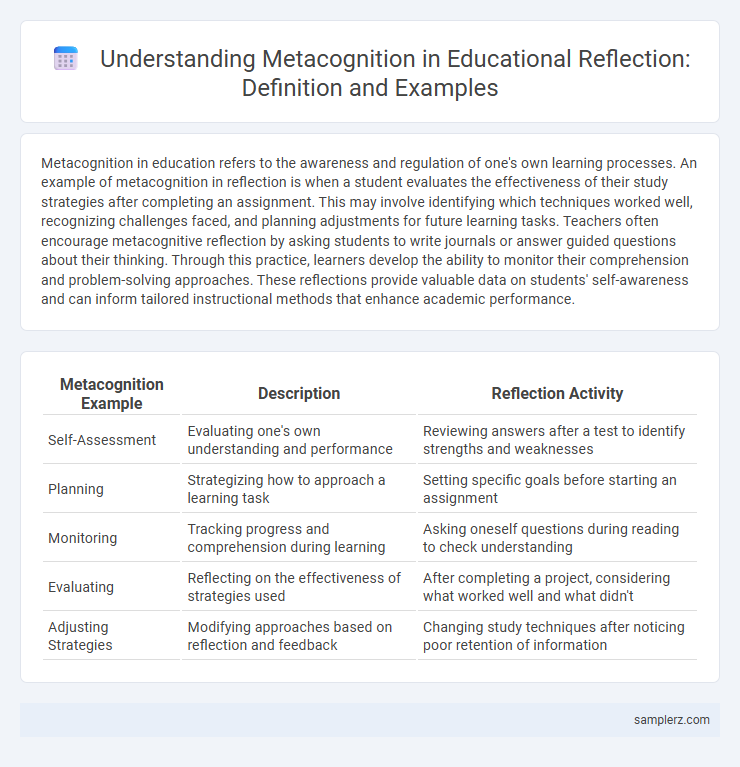Metacognition in education refers to the awareness and regulation of one's own learning processes. An example of metacognition in reflection is when a student evaluates the effectiveness of their study strategies after completing an assignment. This may involve identifying which techniques worked well, recognizing challenges faced, and planning adjustments for future learning tasks. Teachers often encourage metacognitive reflection by asking students to write journals or answer guided questions about their thinking. Through this practice, learners develop the ability to monitor their comprehension and problem-solving approaches. These reflections provide valuable data on students' self-awareness and can inform tailored instructional methods that enhance academic performance.
Table of Comparison
| Metacognition Example | Description | Reflection Activity |
|---|---|---|
| Self-Assessment | Evaluating one's own understanding and performance | Reviewing answers after a test to identify strengths and weaknesses |
| Planning | Strategizing how to approach a learning task | Setting specific goals before starting an assignment |
| Monitoring | Tracking progress and comprehension during learning | Asking oneself questions during reading to check understanding |
| Evaluating | Reflecting on the effectiveness of strategies used | After completing a project, considering what worked well and what didn't |
| Adjusting Strategies | Modifying approaches based on reflection and feedback | Changing study techniques after noticing poor retention of information |
Recognizing Thought Patterns During Study
Recognizing thought patterns during study involves identifying habits such as overgeneralization or selective attention that impact learning efficiency. Students can enhance metacognition by routinely evaluating how these patterns influence comprehension and retention. Strategies like self-questioning and journaling support awareness and adjustment of cognitive approaches for improved academic performance.
Assessing Understanding After a Lesson
Assessing understanding after a lesson involves students evaluating their grasp of key concepts by identifying areas of confusion and summarizing main ideas. This metacognitive practice helps learners recognize knowledge gaps and adjust study strategies accordingly. Reflective questioning and self-assessment checklists are effective tools to enhance students' awareness of their own learning processes.
Evaluating Success of Problem-Solving Strategies
Evaluating the success of problem-solving strategies involves students critically analyzing which methods led to correct solutions and identifying any errors encountered during the process. This metacognitive reflection enables learners to adjust their approaches, enhancing future problem-solving efficiency and effectiveness. Incorporating self-assessment tools and guided reflection prompts supports deeper understanding and helps develop adaptive learning skills in educational settings.
Questioning Assumptions in Learning Tasks
Questioning assumptions in learning tasks involves students critically examining their prior beliefs and the information presented, leading to deeper understanding and improved problem-solving skills. This metacognitive strategy encourages learners to challenge the validity of their initial ideas and consider alternative perspectives. By actively reflecting on these assumptions, students enhance their ability to adapt strategies and achieve more effective learning outcomes.
Identifying Strengths and Weaknesses in Assignments
Identifying strengths and weaknesses in assignments involves metacognitive skills such as self-assessment and critical evaluation, enabling students to recognize areas of mastery and concepts needing improvement. Reflective practices encourage learners to analyze feedback and their own work processes, fostering deeper understanding and targeted skill development. Employing metacognition in this way enhances academic performance by promoting strategic adjustments and continuous learning.
Adjusting Learning Approaches Based on Feedback
Adjusting learning approaches based on feedback demonstrates metacognition by enabling students to analyze their understanding and modify strategies for improved outcomes. For example, after receiving teacher comments highlighting weak areas in an essay, learners might revise their research methods or argument structure to enhance clarity and depth. This reflective process fosters self-awareness and promotes continuous improvement in educational performance.
Predicting Outcomes Before Completing Tasks
Predicting outcomes before completing tasks is a key aspect of metacognition that enhances student learning by encouraging anticipation of results and potential challenges. Students who engage in this reflective practice develop stronger problem-solving skills and improve their ability to regulate cognitive processes during complex tasks. Research shows that prediction exercises increase accuracy in self-assessment, leading to better academic performance and goal-setting strategies.
Tracking Progress Towards Academic Goals
Tracking progress towards academic goals involves metacognitive strategies such as self-monitoring comprehension and evaluating study methods to enhance learning effectiveness. Students regularly assess their understanding of material and adjust their approaches based on feedback or performance, promoting deeper insight into their own cognitive processes. This reflective practice fosters greater academic achievement by enabling learners to identify strengths, address weaknesses, and optimize goal attainment strategies.
Setting Actionable Steps for Future Improvement
Setting actionable steps for future improvement involves identifying specific goals based on self-assessment and monitoring learning strategies during reflection. Students who use metacognition design clear, measurable objectives such as allocating extra study time to challenging topics or practicing problem-solving techniques. This targeted approach enhances self-regulation and promotes continuous academic growth.
Comparing Different Reflection Techniques
Comparing different reflection techniques in education reveals distinct metacognitive benefits, such as journaling encouraging introspective thought and self-questioning fostering critical analysis of learning processes. Mind mapping enhances connections between concepts and supports visual learners by organizing reflections spatially. Evaluating these methods allows educators to tailor metacognitive strategies that optimize student self-awareness and learning outcomes.

example of metacognition in reflection Infographic
 samplerz.com
samplerz.com